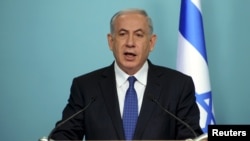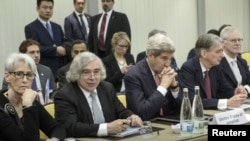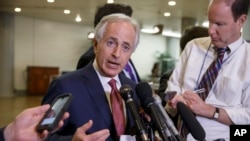President Barack Obama said the framework nuclear agreement reached last week with Iran represents a “once-in-a-lifetime” opportunity to bring some stability to the Middle East - stability which would be good for Israel as well as other nations. However, some members of the U.S. Congress remain unconvinced and a key U.S. lawmaker plans to go ahead with legislation requiring Obama to submit any final agreement to Congress for debate and a vote.
Speaking to The New York Times Sunday, Obama said he would consider it a fundamental failure of his presidency, if, on his watch or as a consequence of work that he has done, Israel was rendered more vulnerable. He said that would be not just a strategic failure, but a moral failure.
Message to Israeli people
Asked what his message is to the Israeli people about the agreement, the president said that while they have a right to be concerned about Iran, they should be equally concerned Iran is not able to acquire nuclear weapons. He said there is no better option to ensure that doesn’t happen than the framework agreement reached in Switzerland. The framework is an outline to be used during subsequent negotiations on a final agreement by the end of June.
“Iran will not get a nuclear weapon on my watch,” Obama said. But he also expressed hope this diplomatic arrangement can “usher in a new era in U.S.-Iranian relations” and a new era in Tehran’s relations with its neighbors.
Israeli Prime Minister Benjamin Netanyahu, on U.S. television Sunday, called the framework agreement a “bad deal” that gives Iran “a free path to the bomb.”
“It leaves the pre-eminent terrorist state of our time with a vast nuclear infrastructure. Remember, not one centrifuge is destroyed. Thousands of centrifuges will be left spinning uranium. Not a single [nuclear] facility, including underground facilities, is being shut down.
"This is a deal that leaves Iran the capacity to produce the material for many, many nuclear bombs. It does so by lifting the sanctions pretty much upfront. So, Iran will have billions of dollars flowing into its coffers not for schools, or hospitals, or roads, but to pump up its worldwide terror machine and its military machine, which is busy conquering the Middle East, as we speak,” Netanyahu said.
He said this is not a partisan issue, or just an Israeli issue, it is a world issue because everyone will be threatened by nuclear-armed Iran.
Stringent restrictions
U.S. Energy Secretary Ernest Moniz, who took part in the negotiations, said the agreement will give the international community “almost instantaneous” recognition of any attempt by Iran to evade the deal. Moniz called it a long-term arrangement.
“There is no sunset. There will be a lot of phases starting with extremely stringent restrictions on Iran’s program. Hopefully, they will comply for a long time, build up confidence. But, we have 10-year restrictions, 15-year restrictions, 25-year restrictions, and we have forever-restrictions. So, this is a long-term program, not something that will go away in a few years,” he said.
Moniz said the agreement calls for unprecedented access to Iran’s nuclear program, not just declared sites, but to any covert aspects of their infrastructure.
Many unkowns
The chairman of the U.S. Senate Foreign Relations Committee, Tennessee’s Bob Corker, said many details of the agreement are not yet known, making it difficult to determine if this is a good or bad agreement. He said there appear to be discrepancies on how sanctions will be relieved. He also wants to know how snap inspections will be conducted on covert aspects of Iran’s nuclear program, as well as its military dimensions.
“Again, I’m open. I know there will be a lot of details worked out over the next several months. That’s why, on behalf of the American people, Congress needs to be playing a role. What the American people may not know right now is that there will be all kinds of classified annexes that are very important.
"They lay out the details as to how much of this is going to take place. And, that’s why it’s so important that Congress play its rightful role in approving this prior to the congressionally-mandated sanctions that we put in place are alleviated,” said Corker.
Corker said his committee will go ahead with plans to vote April 14 on legislation requiring the president to submit a final agreement to Congress for debate and a vote. It would prohibit Obama from suspending sanctions during a 60-day congressional review. However, he acknowledged he is uncertain if he has the required 67 votes in the 100-seat chamber to override a presidential veto.







